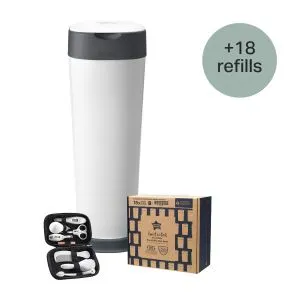
Ultimate XL Nappy Disposal Bundle with 18 Refills
Bundle & Save 40%
Subscription orders can be cancelled at anytime. Free delivery on all subsequent subscription orders. Find out more about subscriptions.
They’re easy and fuss free
Your products are automatically sent to you
You save up to 10% when you sign up for a subscription
You can cancel at any time

Midwives, doctors, and the World Health Organisation recommend that a baby is exclusively breastfed for the first six months of their life. But there are many reasons why parents might need to make the switch from directly breastfeeding to bottle feeding at any stage.
When it comes to bottle feeding, there's no doubt that expressed breast milk is the most natural source of nutrition for your baby, but for parents who give their baby formula in a bottle, there's no need to worry. There are advantages of bottle feeding with either breast milk or formula, and we're here to support you and provide the information you need to know, so you can decide what’s right for you and your baby.
When it comes to choosing whether to give your baby breast milk or formula in a bottle, there's no right or wrong choice, just what's best for you and your baby. Every feeding journey is different!
Let us help you decide which option is best for you and your unique journey.
Breast milk is natural food for your baby, filled with all the specific nutrients that they need. It's like their own favourite unique recipe that's made by you just for them. Expressing breast milk using a pump and feeding it to your baby in a bottle rather than directly from the breast means that they will still benefit all the nutritional advantages of breast milk.
Some of the many benefits of breast milk include...
There's lots of support out there if you do want to continue breastfeeding or expressing your breast milk. But if you do choose to feed your baby formula in a bottle instead, you should discuss your options with your doctor, midwife, or health care provider.
Some parents are unable to breastfeed or express breast milk, and the only other option available is to give their baby formula.
Formula is specially developed and balanced with all the nutrients a growing baby needs to thrive. It’s made to mimic the nutrients of human breast milk. If you do give your baby formula milk, there's no reason for you to feel guilty. Your baby will still grow and thrive. If you and your baby are happy and healthy, that's all that matters.
Giving your baby formula milk in a bottle means that...
Explore the Range
Yes, you can. In some cases, parents choose to feed their baby both breast milk and formula.
This is known as combination feeding and can be really helpful for parents who intended to exclusively breastfeed their baby, but their plans haven't worked out for whatever reason.
It can also be a practical choice when parents are planning to go back to work or if they experience a drop in their breast milk supply.
If you want to, it’s possible to safely combine breast milk and formula in the same bottle. To ensure safety, always sterilise feeding equipment, follow formula preparation instructions exactly, and never substitute water for breast milk. When mixing concentrated or powdered formula, prepare it first, then add breast milk. For ready-to-feed formula, simply pour it into the bottle with your expressed milk.
In the first few hours after your baby’s arrival, your breasts won't produce a lot of breast milk. Your early breast milk is called colostrum and is full of nutrients and antibodies that help protect your baby from illness and infection.
It can take between three and five days for your transitional breast milk supply to come through. You may hear this referred to as your breast milk "coming in". And by the time your baby is around two weeks old, the breast milk you produce is known as mature milk.
Here are some general guidelines on how to introduce formula to a breastfed baby:
It’s important to note that every feeding journey is different. What works for one baby and parent may not work for another. If your baby is not taking the formula well or you have any questions or concerns, talk to your midwife or GP.